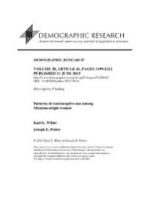
POPULATION AND ENVIRONMENT
metrics 2024
Exploring the Nexus of Demographics and Ecology
Introduction
Population and Environment is a renowned journal published by Springer, focusing on the critical intersection between demographic processes and environmental changes. Established in 1980, the journal has become a leading platform for interdisciplinary research, with its impressive impact reflected in its 2023 rankings, placing it in the Q1 quartile for both Demography and Environmental Science (miscellaneous) categories. With Scopus Ranks highlighting its prominent position (#11 out of 139 in Social Sciences – Demography, and #46 out of 219 in Environmental Science), Population and Environment fosters a rich dialogue among researchers, professionals, and students dedicated to understanding how population dynamics influence environmental conditions and vice versa. Operating without an open access option, the journal ensures high standards for scholarly contributions and remains committed to bridging knowledge gaps in the realms of population studies and environmental science. The journal's rigorous peer-review process and comprehensive archive from 1980 to 2024 solidify its reputation as an invaluable resource for advancing research and informing policy in these critical fields.
Metrics 2024
 0.97
0.97 3.20
3.20 4.40
4.40 63
63Metrics History
Rank 2024
Scopus
IF (Web Of Science)
JCI (Web Of Science)
Quartile History
Similar Journals

Population Review
Unveiling Insights into Population DynamicsPopulation Review, published by Sociological Demography Press, is a vital resource in the field of demography, contributing to the understanding of population dynamics and trends since its inception in 1988. With an ISSN of 1549-0955 and an E-ISSN of the same number, the journal has played a significant role in disseminating scholarly research and analysis relevant to demographic changes and their implications. Although currently categorized in the Q4 quartile, it ranks 78th out of 139 in the Scopus Social Sciences: Demography category, placing it within the 44th percentile among its peers. This journal serves as a platform for researchers, professionals, and students to engage with contemporary population issues, encouraging the exploration of new theories and methodologies. While not available as open access, its robust editorial standards and commitment to rigorous research make it an invaluable addition to the libraries of demographers and social scientists alike.

Spatial Demography
Transforming Understanding of Demographic TrendsSpatial Demography is a vital academic journal published by Springer International Publishing AG, focusing on the intersection of spatial analysis and demographic research. With its ISSN 2364-2289 and E-ISSN 2164-7070, this journal aims to advance understanding of population dynamics through innovative methodologies and spatially explicit data, offering a platform for researchers, professionals, and students engaged in demography, geography, and urban studies. While it does not currently operate under an open access model, Spatial Demography maintains a rigorous peer-review process to ensure high-quality publications that contribute significantly to the field. Given the growing importance of spatial data in demographic research, the journal serves as an essential resource for those looking to explore how spatial attributes influence demographic processes and patterns worldwide. The official address of the publisher is Gewerbestrasse 11, Cham CH-6330, Switzerland.

GLOBAL CHANGE BIOLOGY
Advancing Insights into Ecological TransformationsGLOBAL CHANGE BIOLOGY, published by Wiley, is a leading journal dedicated to advancing the scientific understanding of the relationships between biological systems and global environmental changes. With an impressive impact factor placing it in the Q1 category across multiple disciplines—including Ecology, Environmental Chemistry, and Global and Planetary Change—this journal is essential for researchers, professionals, and students aiming to stay at the forefront of this dynamic field. The journal has a rich history since its inception in 1995, continually providing a platform for high-quality research that informs policy and management practices worldwide. Although it is not open access, the journal remains a valuable resource for those committed to exploring the complexities of ecological and environmental change. With a Scopus ranking of #3 in Global and Planetary Change and #6 in both Ecology and Environmental Chemistry, GLOBAL CHANGE BIOLOGY continues to shape the dialogue on the pressing environmental challenges of our time.

DEMOGRAPHY
Shaping the future through population studies.DEMOGRAPHY is a prestigious, peer-reviewed journal published by DUKE UNIVERSITY PRESS, dedicated to advancing the field of demography through scholarly research and critical discourse. With an esteemed Q1 ranking in Social Sciences and an impressive Scopus rank of #10 out of 139 in the category, this journal holds a 93rd percentile status, reflecting its significant impact on the academic community. Covering a wide range of topics related to population studies, including fertility, mortality, migration, and demographic change, DEMOGRAPHY serves as a vital resource for researchers, professionals, and students alike. Since its inception in 1964, it has provided a platform for innovative studies and influential articles that address both theoretical frameworks and applied research. Although not an open-access journal, it ensures that its contributions reach a global audience while maintaining rigorous academic standards. Engage with DEMOGRAPHY to explore and contribute to the dynamic discussions shaping our understanding of human populations in a complex world.

Canadian Studies in Population
Elevating the Discourse on Canadian DemographicsCanadian Studies in Population, published by Springer, is a prestigious journal dedicated to advancing the field of demography and the history of population studies within Canada and beyond. With an ISSN of 0380-1489 and an E-ISSN of 1927-629X, this journal has proudly contributed to scholarly discourse since its inception in 1975, and continues to make significant impacts through its rigorous research articles and comprehensive reviews. Recognized for its high academic standards, it boasts a Q2 ranking in Demography and a Q1 ranking in History in 2023, reflecting the journal's critical role in shaping contemporary understanding of demographic trends and historical population developments. With a Scopus rank of #51/139 in Demography and #83/1760 in History, it appeals to a diverse audience including researchers, professionals, and students eager to explore population dynamics, historical context, and societal implications of demographic shifts. While the journal maintains traditional subscription access options, its rigorous peer-reviewed content ensures that it remains a cornerstone for scholars seeking credible and influential insights in their respective fields.

Demographic Research
Connecting global perspectives on demographic evolution.Demographic Research is a leading journal in the field of demography, published by the prestigious Max Planck Institute for Demographic Research. Available in both print and electronic formats (ISSN: 1435-9871, E-ISSN: 1435-9871), this open-access journal has been a valuable resource for demographers and social scientists since its inception in 1999. With a commendable impact factor and ranked Q1 in its category, the journal demonstrates a significant commitment to advancing our understanding of demographic trends and their implications across contexts. Hailing from Germany, the journal's rich international perspective adds depth to its studies, making it a vital platform for innovative research. Researchers, professionals, and students are encouraged to engage with its wealth of articles that not only document demographic changes but also offer insights critical for policy-making and social planning. The journal's broad scope encompasses diverse themes, providing a comprehensive overview of the demographic shifts that shape societies today.

Espaces-Populations-Societes
Bridging the Gap Between Population Studies and Spatial PlanningEspaces-Populations-Sociétés is a distinguished journal published by UNIV LILLE I SCI & TECH, focusing on the fields of demography and geography. Established in 1983, this open-access journal has committed itself to providing a platform for innovative research and discussions around population dynamics and spatial organization, with accessibility to its content available since 2004. Based in France, at the UFR Géographie & Aménagement, the journal plays a crucial role in advancing understanding of demographic trends and planning developments. With current Scopus rankings highlighting its position in the 25th and 14th percentiles for Demography and Geography, Planning and Development respectively, it maintains a reputable standing within academic circles, establishing its importance in contemporary research landscapes. Researchers, professionals, and students alike will find valuable insights in its comprehensive overview of sociocultural and environmental interactions, as well as place-based issues at the heart of societal development.

Papeles de Poblacion
Bridging local insights with global discourse.Papeles de Población, published by the Universidad Autónoma del Estado de México, is a prominent open-access journal that has been advancing the field of demography since its inception in 1997. With an ISSN of 1405-7425, this journal aims to foster a deeper understanding of population studies through research articles, reviews, and critical analyses that address the complex dynamics of demographic changes, social structures, and their implications. While currently ranked in the fourth quartile of its category in 2023, it serves as a significant channel for researchers, professionals, and students to disseminate and access cutting-edge findings. Open access since 2004, it provides a platform for broader readership and knowledge sharing, thus contributing to the global discourse on population issues. Based in Mexico, the journal is committed to embracing diverse perspectives, emphasizing the importance of regional studies within a global context.

JOURNAL OF POPULATION RESEARCH
Exploring the dynamics of human populations.JOURNAL OF POPULATION RESEARCH, published by Springer, is a premier journal dedicated to advancing the field of demographic studies. With a focus on research that addresses the complexities of population dynamics, this journal serves as a vital platform for scholars, practitioners, and students alike. It holds a commendable Q2 ranking in the Demography category for 2023, underscoring its influence and commitment to quality research. The journal spans a rich convergence of knowledge from 2005 to 2024, covering key developments and emerging trends in population research. Although it operates under a traditional access model, its impact continues to resonate throughout the academic community, highlighting the importance of robust demographic analysis in policy and planning. By fostering insightful discussions and providing access to groundbreaking studies, the JOURNAL OF POPULATION RESEARCH remains an essential resource for those eager to deepen their understanding of population issues.

Novedades en Poblacion
Advancing Knowledge in Demographic StudiesNovedades en Poblacion is a pivotal academic journal dedicated to the interdisciplinary exploration of demographic studies, population policies, and social dynamics, published by UNIV HABANA. Since its inception in 2005, this open access journal has provided a platform for researchers, professionals, and students to disseminate and discuss cutting-edge research and findings relevant to populations in Latin America and beyond. With a commitment to high-quality scholarship, Novedades en Poblacion plays a vital role in contributing to the global conversation on demographic changes, migration patterns, and socio-economic impacts on populations. Researchers are encouraged to submit original articles, reviews, and studies that advance the understanding of demographic issues, making it an essential resource for those engaged in the fields of sociology, public health, and urban studies.